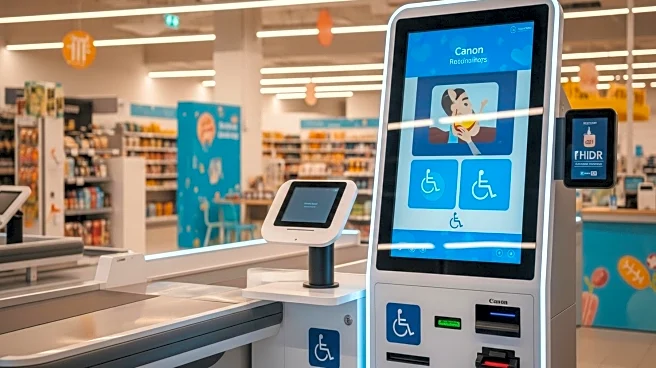What's Happening?
Target Corporation has announced the nationwide rollout of a new accessible self-checkout system designed to assist guests with disabilities, including those who are blind or have low vision. This initiative, set to debut during the holiday season and continue into early 2026, aims to improve the shopping experience by incorporating features such as tactile controllers, audio prompts, and guest-first technology. The system includes Braille and high-contrast button icons, a headphone jack with adjustable volume controls, physical navigation buttons, and a custom tactile controller developed in collaboration with Elo. The project was led by Steve Decker, Target's senior manager of user experience accessibility, who is blind, and was developed with input from the National Federation of the Blind.
Why It's Important?
This development is significant as it represents a major step forward in accessibility within the retail industry. By prioritizing inclusive design, Target is not only enhancing the shopping experience for disabled guests but also setting a precedent for other retailers to follow. The initiative underscores the importance of accessibility in driving innovation and growth, potentially increasing the number of people who can shop and work at Target. This aligns with Target's mission to help all families discover the joy of everyday life, and it positions the company as a leader in accessibility and a partner in the quest for equal access.
What's Next?
Target plans to continue investing in guest-first improvements to make shopping trips easier and more welcoming. The rollout of the accessible self-checkout system is part of a broader strategy to enhance the holiday shopping experience, with additional efforts to deliver holiday magic. The company will likely monitor feedback from guests and stakeholders to refine and expand its accessibility initiatives. As the system is implemented nationwide, Target may explore further collaborations with organizations like the National Federation of the Blind to ensure ongoing improvements.
Beyond the Headlines
The introduction of accessible self-checkout systems may have broader implications for the retail industry, potentially influencing other companies to adopt similar technologies. This could lead to a shift in how accessibility is integrated into retail environments, promoting inclusivity and independence for disabled individuals. Additionally, the collaboration with the National Federation of the Blind highlights the importance of involving affected communities in the design process, which could become a standard practice in developing accessible technologies.










